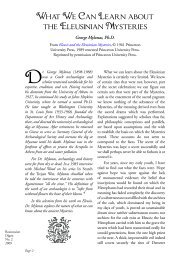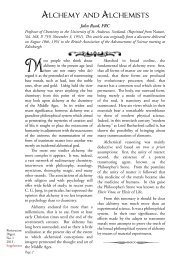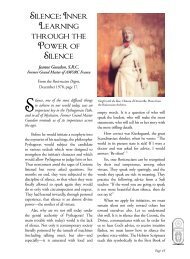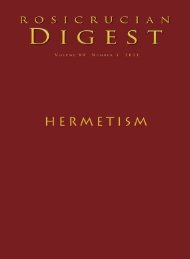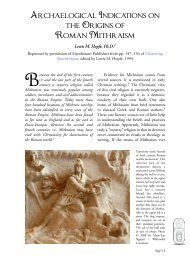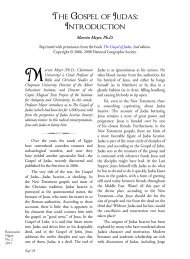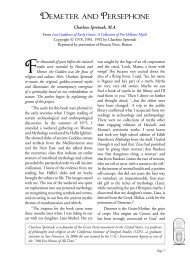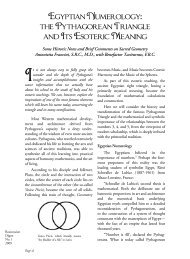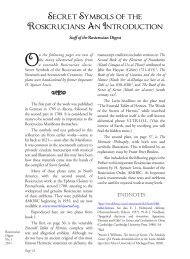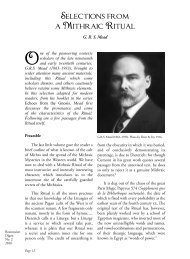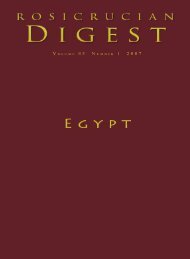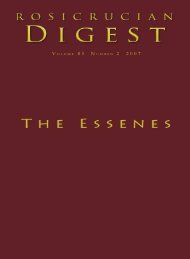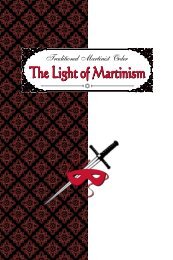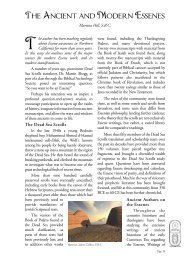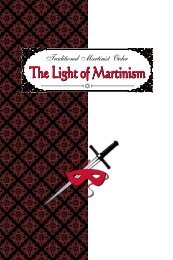Pythagorean Teachings across the Centuries - Rosicrucian Order
Pythagorean Teachings across the Centuries - Rosicrucian Order
Pythagorean Teachings across the Centuries - Rosicrucian Order
Create successful ePaper yourself
Turn your PDF publications into a flip-book with our unique Google optimized e-Paper software.
spasms. Each of <strong>the</strong>se he corrected by <strong>the</strong><br />
rule of virtue, attempering <strong>the</strong>m through<br />
appropriate melodies, as through some<br />
salutary medicine.<br />
“In <strong>the</strong> evening, likewise, when his<br />
disciples were retiring to sleep, he would thus<br />
liberate <strong>the</strong>m from <strong>the</strong> day’s perturbations<br />
and tumults, purifying <strong>the</strong>ir intellective<br />
powers from <strong>the</strong> influxive and effluxive<br />
waves of corporeal nature, quieting <strong>the</strong>ir<br />
sleep, and rendering <strong>the</strong>ir dreams pleasing<br />
and prophetic. When <strong>the</strong>y arose again in<br />
<strong>the</strong> morning, he would free <strong>the</strong>m from <strong>the</strong><br />
night’s heaviness, coma and torpor through<br />
certain peculiar chords and modulations,<br />
produced by ei<strong>the</strong>r simply striking <strong>the</strong> lyre,<br />
or adapting <strong>the</strong> voice.<br />
“Not through instruments or physical<br />
voice-organs did Pythagoras effect this; but<br />
by <strong>the</strong> employment of a certain indescribable<br />
divinity, difficult of apprehension,<br />
through which he ex-tended his powers of<br />
hearing, fixing his intellect on <strong>the</strong> sublime<br />
symphonies of <strong>the</strong> world, he alone apparently<br />
hearing and grasping <strong>the</strong> universal harmony<br />
and consonance of <strong>the</strong> spheres, and <strong>the</strong> stars<br />
that are moved through <strong>the</strong>m, producing<br />
a melody fuller and more intense than<br />
anything effected by mortal sounds.<br />
“This melody was also <strong>the</strong> result of<br />
dissimilar and varying sounds, speeds,<br />
magnitudes, and intervals arranged with<br />
reference to each o<strong>the</strong>r in a certain musical<br />
ratio, producing a convoluted motion most<br />
musical and gentle. Irrigated <strong>the</strong>refore<br />
with this melody, his intellect ordered and<br />
exercised <strong>the</strong>reby, he would, to <strong>the</strong> best of his<br />
ability exhibit certain symbols of <strong>the</strong>se things<br />
to his disciples, especially through imitations<br />
<strong>the</strong>reof through instruments or <strong>the</strong> physical<br />
organs of voice.<br />
“For he conceived that, of all <strong>the</strong><br />
inhabitants of earth, by him alone were <strong>the</strong>se<br />
celestial sounds understood and heard, as if<br />
coming from <strong>the</strong> central spring and root of<br />
nature. He <strong>the</strong>refore thought himself worthy<br />
to be taught, and to learn something about<br />
<strong>the</strong> celestial orbs, and to be assimilated to<br />
<strong>the</strong>m by desire and imitation, inasmuch<br />
as his body alone had been well enough<br />
conformed <strong>the</strong>reto by <strong>the</strong> divinity who had<br />
given birth to him.<br />
“This peculiar organization of Pythagoras’s<br />
body, far finer than that of any o<strong>the</strong>r person,<br />
seems to be what Empedocles was obscurely<br />
driving at in his enigmatical verses:<br />
Among <strong>the</strong> <strong>Pythagorean</strong>s was a man<br />
transcendent in knowledge;<br />
Who possessed <strong>the</strong> most ample stores of<br />
intellectual wealth,<br />
And in <strong>the</strong> most eminent degree assisted<br />
in <strong>the</strong> works of <strong>the</strong> wise.<br />
When he extended all <strong>the</strong> powers of his<br />
intellect,<br />
He easily beheld everything,<br />
As far as ten or twenty ages of <strong>the</strong><br />
human race!<br />
“These words ‘transcendent,’ ‘he beheld<br />
every detail of all beings,’ and ‘<strong>the</strong> wealth of<br />
intellect,’ and so on, describe as accurately<br />
as possible his peculiar and exceptionally<br />
accurate method of hearing, seeing and<br />
understanding.” 18<br />
The <strong>Pythagorean</strong> use of music <strong>the</strong>rapy<br />
did not end with <strong>the</strong> dissolution of <strong>the</strong> school<br />
of Crotona. Examples include <strong>the</strong> “Turco-<br />
Persian psychologist and music <strong>the</strong>orist<br />
al-Farabi (872–950), known as Alpharabius<br />
in Europe, dealt with music <strong>the</strong>rapy in his<br />
treatise Meanings of <strong>the</strong> Intellect, where he<br />
discussed <strong>the</strong> <strong>the</strong>rapeutic effects of music<br />
on <strong>the</strong> soul. 19 Robert Burton wrote in<br />
his seventeenth-century classic work, The<br />
Anatomy of Melancholy, that music and dance<br />
were critical in treating mental illness, 20<br />
especially melancholia.” 21<br />
From <strong>the</strong> Greek traditions of<br />
Neoplatonism and Neopythagoreanism, <strong>the</strong><br />
tradition of <strong>the</strong> school of Crotona moved<br />
Page xxxiii



